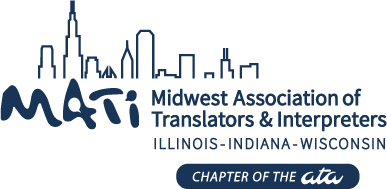MATI's 11th Annual Conference: Interpreting in Pediatrics
At MATI’s 11th Annual Conference in Madison, Wisconsin in September, Jennifer Flamboe gave the presentation “Interpreting in Pediatrics: Building Blocks for Success.” Flamboe began her presentation by defining pediatric medicine, or the branch of medicine geared toward the physical, emotional and social health of individuals between the ages of 0 and 21.
Flamboe noted that pediatrics encompasses a wide range of subspecialties, including pediatric critical care medicine, neonatal-perinatal medicine, and developmental-behavioral pediatrics, among others. The age group and wide range of specialties associated with pediatrics require a special awareness and knowledge base on the part of the interpreter.
According to Flamboe, pediatric interpreters must continuously reassess their environment in order to fulfill their roles as facilitators of communication. This continual reassessment allows the interpreter to make adjustments as necessary in such areas as register (i.e. more simplified language for children) and in the mode of interpretation (i.e. switching between consecutive and simultaneous interpretation).
Along with fulfilling the role of advocate for the patient and her family plus the role of cultural broker for all parties, the pediatric interpreter must also establish a rapport with both patients and their families. Taking a moment to extend ritual greetings at the onset sets the tone for the entire experience, according to Flamboe, and goes a long way toward building the trust necessary for navigating the medical encounter.
Flamboe emphasized the importance of understanding that child health decision-making is family-centered decision-making, and that families and children are more likely to adhere to treatment plans when the child is included in the establishment of that plan. Successfully including the child requires medical personnel to adjust their communication based on the age of their patient.
Flamboe noted that children communicate before they can even use words, so for infants (ages 0-1 year old), crying might convey anxiety at being around strangers. When working with early childhood aged children (1-5 years old), personnel need to allow for a “warm up” of sorts, by using simplified words and giving the child the opportunity to handle basic equipment. For school-aged children (ages 6-11 years old), practitioners will respond to children’s curiosity, sharing explanations, asking for patients help, and encouraging expression of feelings. Finally, for adolescents (12-17 years old), doctors and nurses will consider such issues as privacy and the influence of peers, while avoiding judgments or criticisms.
For Flamboe, pediatric interpreting is also about controlling the flow of communication. She noted that decisions on the child’s health must include family members and providers and that it’s the interpreter’s job to facilitate the discussion among those individuals. That facilitation requires assertiveness, as the interpreter mitigates family power dynamics, cultural behaviors, understanding children’s speech patterns and ensuring they are allowed the time to interpret. At the same time, interpreters must also learn to deal with their own feelings, which can be especially difficult when experiencing a natural protectiveness and desire to nurture their child patients. Overall, Flamboe encourages the pediatric interpreter to maintain her professional boundaries and neutrality.
Jennifer Flamboe is Chair of the World Languages department at Alverno College in Milwaukee, Wis., where she is also assistant professor of Spanish and director of the Spanish/English Healthcare Interpretation program. She holds an M.A. in Foreign Languages and Linguistics from the University of Wisconsin-Milwaukee with concentrations in Spanish linguistics and translation and is a nationally-certified Spanish interpreter through the Certification Commission for Healthcare Interpreters (CCHI).
